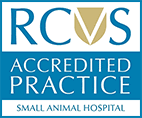What is neutering?
Neutering is a surgical procedure performed under general anaesthesia to remove part or all of an animals' reproductive organs, preventing them from reproducing. In males, it is called castration and in females, spaying. We know that neutering provides significant benefits for you and your pet and is directly associated with helping pets to live happier, healthier lives.
- Neutering stops females and males from reproducing, this procedure is performed under general anaesthesia, and your pet would stay with us as a day patient. Neutering has multiple health benefits and enables us to make a better world for pets.
- Neutering is the name for the surgery performed to remove the ability to reproduce. This procedure is performed under general anaesthesia and is directly associated with helping pets live happier, healthier lives.
- Neutering is the name for when either female and male animals are operated on to remove their reproductive organs. This procedure is linked closely with helping pets live healthier and happier lives.
- Neutering is the term for both male and female surgery that removes the reproductive organs to stop pregnancies from occurring. We know that neutering has many benefits.
Dog neutering
In male dogs, both testicles are removed; this is known as 'castration'. In female dogs, either the uterus is removed or both the uterus and the ovaries; this is known as 'spaying'.
Spaying a female dog eliminates the ability to reproduce, and your dog will no longer come into season. Females can be neutered from six months of age; for most breeds, we suggest spaying females before they have had a season known as (pre-season). If your dog is older than six months or has already started having seasons, we would need to wait three months after a season to ensure we are operating at the best possible time.
At what age are dogs neutered?
Neutering is usually carried out at around six months of age for males and pre-season for female dogs, reducing the likelihood of females developing mammary cancer. We would also consider your dog's breed, size, overall behaviour and other risk factors to provide the most suitable recommendation for your dog based on the latest evidence.
Male dogs older than six months can be neutered at any stage; however, we would still consider the dog's breed, size, overall behaviour and other risk factors upon discussion of the procedure.
If your dog is not spayed before her first season, we will wait three months after the season as this is the safest possible time to carry out the procedure as the uterus will be less vascular.
Laparoscopic or 'Keyhole' spaying
We also offer laparoscopic spays, which are spays performed using Keyhole Surgery.
Vets operate using three small 'keyhole' incisions, a special camera and surgical instruments to enable the procedure to be performed with minimal surgical intervention. Following a 'Lap' Spay, the patient is left with three small wounds instead of a larger abdominal wound.
The advantages of Keyhole spays (or 'Lap Spays') in female dogs:
- Keyhole surgery is generally a safer and less invasive method of surgery
- It reduces the trauma caused to tissues
- Pain post-operatively is lower
- Recovery times are quicker
- As the surgical wounds are much smaller, the problems associated with wound licking and the chewing of stitches is significantly reduced
Should I let my dog have one litter before spaying her?
This happens to be a common question, and there are no known health benefits to letting your dog have a litter; this is also the same for cats and rabbits.
Dog neutering benefits:
- Reduces prostatic disease in males
- Reduces male to male aggression in some cases
- Eliminates womb infections in females (which can be fatal)
- Eliminates false pregnancies in females
- Reduced mammary cancer risk in females spayed pre-season
- It eliminates testicular cancer in males and ovarian cancer in females
- Reduces roaming behaviours
- No risk of unwanted pregnancies
- Reduces scent marking
General anaesthesia
Your pet requires a general anaesthetic for neutering; here at Brentknoll Veterinary Centre, we have measures in place to ensure their safety during the procedure. A dedicated Registered Veterinary Nurse (RVN) will monitor your pet throughout their surgery and recovery. All anaesthesia comes with some form of risk; however, these are very low, especially neutering, as pets are often young, fit, and healthy when having this procedure. Risk levels of anaesthesia increase with a pet's age, certain breeds and if your pet has any underlying health conditions. We can perform a pre-anaesthetic blood test before your pet's surgery to detect any underlying illnesses; this can be discussed when booking in for the procedure and on the day of surgery. Your pet will receive a premedication to relax them and will also receive two types of pain relief. Rest assured, the Brentnoll Veterinary team will be with your pet every step of the way.
Your pet will stay the day with us
On the day of the procedure, please bring your dog on a secure collar, harness and lead; during the admission appointment, we will discuss the procedure and go through the consent form. (Please note we must gain a signature from the registered owner (over 18) or authorised agent on the consent form). Your dog, cat or rabbit will be admitted as a 'day patient', and they will be discharged later that day once our team are happy with how your pet has recovered. During your pet's discharge appointment, the team will go through everything you need to know about caring for your pet after their surgery and pain relief medication. We are always at the end of the telephone for you and your pet, so please contact us if you have any further questions once you have your pet settled back at home. Day telephone 01935 355938 or Out of hours (Vets Now) telephone number 01905 780404.
Brentknoll Veterinary Centre Pet Health Plan for Life members can claim a 15% discount off any neutering procedure. Our health club offers preventative health, and you could be saving each year on what you spend on your pet treatment wise.
Cat neutering
Cats reach reproductive maturity rapidly; we follow the RSPCA and Cats Protection League (CPL) guidelines recommending neutering both female and male cats around four months of age. Spaying a female cat involves removing their ovaries and uterus. Castrating a male cat involves removing both of their testes.
Cat neutering benefits:
- Reduces cat to cat fighting
- Prevention of testicular cancer
- Reduces roaming behaviours
- No risk of unwanted pregnancies
- Reduces spraying
Should I let my cat have one litter before spaying her?
This happens to be a common question, and there are no known health benefits to letting your cat have a litter; this is also the same for dogs and rabbits.
General anaesthesia
Your pet requires a general anaesthetic for neutering; here at Brentknoll Veterinary Centre, we have measures in place to ensure their safety during the procedure. A dedicated Registered Veterinary Nurse (RVN) will monitor your pet throughout their surgery and recovery. All anaesthesia comes with some form of risk; however, these are very low, especially neutering, as pets are often young, fit, and healthy when having this procedure. Risk levels of anaesthesia increase with a pet's age, certain breeds and if your pet has any underlying health conditions. We can perform a pre-anaesthetic blood test before your pet's surgery to detect any underlying illnesses; this can be discussed when booking in for the procedure and on the day of surgery. Your pet will receive a premedication to relax them and will also receive two types of pain relief. Rest assured team at Brentknoll Veterinary Centre will be with your pet every step of the way.
Your pet will stay the day with us
On admission, we will discuss the procedure and go through the consent form. (Please note we must gain a signature from the registered owner (over 18) or authorised agent on the consent form). Your dog, cat or rabbit will be admitted as a 'day patient', and they will be discharged later that day once our team are happy with how your pet has recovered. During your pet's discharge appointment, the team will go through everything you need to know about caring for your pet after their surgery and pain relief medication. We are always at the end of the telephone for you and your pet, so please contact us if you have any further questions once you have your pet settled back at home. Day telephone 01935 355938 or Out of hours (Vets Now) telephone number 01905 780404.
Please bring your cat in a secure cat basket with a blanket that smells of home. Cats are territorial creatures who prefer to stay in areas familiar to them; click here to read how you can prepare for travelling to us with your cat. Here at Brentknoll Veterinary Centre, we hold the ISFM silver accreditation which means our practice has everything in place to help your cat have a positive experience with us.
Brentknoll Veterinary Centre Pet Health Plan For Life members can claim a 15% discount off any neutering procedure. Our health club offers preventative health, and you could be saving each year on what you spend on your pet treatment wise.
Rabbit Neutering
Rabbits are usually neutered around four months of age. Castration involves removing the testes of a male rabbit, and spaying is the removal of the uterus and ovaries of a female. It is worth noting that sperm can reside in the genital tract for up to six weeks, so it's best to keep your rabbit away from un-neutered females during this time. Rabbits are extremely social creatures; neutering helps pair or bond rabbits, making them much happier.
Rabbit neutering benefits:
- Eliminates prostatic and testicular cancer
- Helps owners to litter train rabbits
- Reduces aggressive behaviours, especially in males
- Eliminates womb infections in females
- Eliminates uterine cancer in females
- No risk of unwanted pregnancies
- Reduces spraying
- Promotes successful bonding of rabbits
Should I let my rabbit have one litter before spaying her?
This happens to be a common question, and there are no known health benefits to letting your rabbit have a litter; this is also the same for dogs and cats.
General anaesthesia
Your pet requires a general anaesthetic for neutering; here at Brentknoll Veterinary Centre, we have measures in place to ensure their safety during the procedure. A dedicated Registered Veterinary Nurse (RVN) will monitor your pet throughout their surgery and recovery.
Although rabbits are deemed to be a 'high risk' under anaesthesia, the health benefits alone far outweigh the risks; over the years, rabbit anaesthesia has become much safer. Risk levels of anaesthesia increase with a pet's age, certain breeds and if your pet has any underlying health conditions. Your pet will receive a premedication to relax them and will also receive two types of pain relief. Rest assured the Brentknoll Veterinary team will be with your pet every step of the way.
Your pet will stay the day with us
On admission, we will discuss the procedure and go through the consent form. (Please note we must gain a signature from the registered owner (over 18) or authorised agent on the consent form). Your dog, cat or rabbit will be admitted as a 'day patient', and they will be discharged later that day once our team are happy with how your pet has recovered. During your pet's discharge appointment, the team will go through everything you need to know about caring for your pet after their surgery and pain relief medication. We are always at the end of the telephone for you and your pet, so please contact us if you have any further questions once you have your pet settled back at home. Day telephone 01935 355938 or Out of hours (Vets Now) telephone number 01905 780404.
Please bring your rabbit in a secure box or basket with a blanket that smells of home; we advise rabbits are brought along with their companions to reduce the stress of separation between a bonded pair. Bringing your rabbits lunch is also preferable. We require rabbits to eat relatively quickly after a general anaesthetic; having their favourite foods on hand speeds up their recovery time so we can have your rabbit back home with you as soon as possible.




